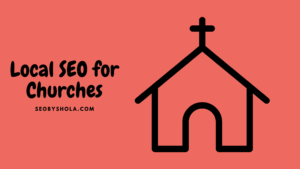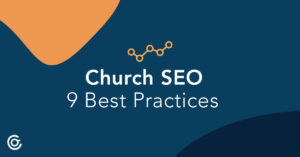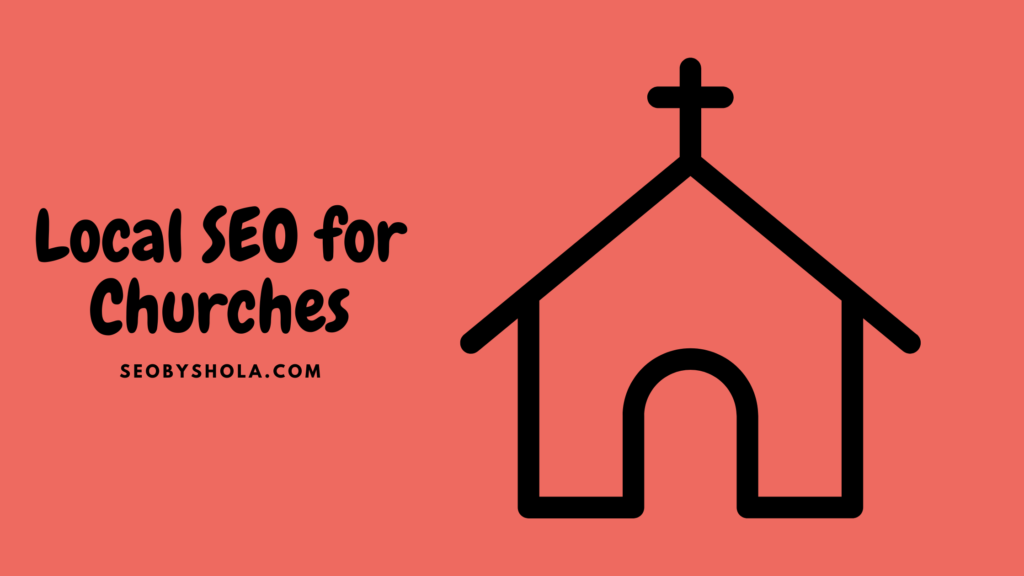Church SEO; If you are a church and need to improve your website’s visibility in local searches, then Local SEO is the perfect way to go. Through strategies like optimizing content for city or region-specific keywords, setting up listings in local directories, registering with Google Maps, and creating local engagement through content marketing, churches can ensure that their website is seen to the right audience locally. By utilizing the latest digital tools and techniques, you can use Local SEO to get your church website out into the spotlight.

-
Develop a Responsive Website
A responsive website is critical for churches as it increases website activity and boosts search engine rankings. When a website is non-responsive, visitors have difficulty accessing information due to unattractive layouts or confusing navigation, leading to high bounce rates. Make sure the church’s website looks great on all device sizes with an attractive design and a clear focus on content.
-
Create Compelling Content
When developing content for the church’s website, use technology-friendly language and keep the tone professional but informal. People are more likely to visit websites that offer insights about their faith such as sermons, inspiring thoughts and stories about successful parishes or projects. SEO should include multiple calls to action linking to available products or services from other sites like donation portals or streaming services.
-
Optimize Keywords
Keywords are one of the most powerful tools although they require research and rigor in their implementation. Investing resources in identifying trending topics around Christianity can help rank higher for popular terms related to churches and Christianity without compromising quality content which helps organic ranking efforts over time rather than just producing quick results through ad buys alone.
-
Increase Online Visibility
Creating traditional and digital media items like articles, videos, graphics, etc., can place your church’s name in front of new potential members by drawing attention from various outlets such as search engines and social media networks like Facebook, Instagram, Pinterest and Twitter, just to name a few. By publishing content that encourages followers to engage with your church, such as sharing prayers directly via social media channels or inviting people to watch online sermons on YouTube will drive backlinks that restate relevance across many platforms.
-
Monitor Analytics Data
Analyzing analytics data helps pastors make decisions based on hard numbers instead of assumptions; it also lets them understand customer journeys like entry points into the site (so pastors know what kind of words users used in their searches), average session duration (to measure engagement) & exit pages (so pastors can see where improvement is needed). By monitoring key performance indicators like page views/visits/time spent on page/conversion rate/device type used etc. Pastors can figure out how best optimize their site for future campaigns using SEO methods.
-
Harness Targeted Advertising
Churches should not underestimate the power of targeted advertising which offers exact targeting options for audience segments by geography & demography plus interests & behaviors allowing churches reach new prospects outside its radius range if desired – all at an incredibly reasonable cost per click (CPC) compared to markets such as retail ecommerce/. Ads also allow more testing possibilities when creating campaigns enabling churches tweak messaging through different videos, images headlines text body copy etc. until they find an optimized combination that pulls maximum conversions.
7. Activate Local SEO Tactics
Local SEO tactics should be activated while building out both organic & paid traffic strategies, so churches show up under regional searches; optimize Google My Business listing with location details hours operation phone number information FAQs staff profiles custom URLs virtual tour etc.; add backlinks from other local sources that already boast authority & generate reviews, so listings attain higher rankings plus stands out versus competition when searched nearby.
7 Reasons Your Church Should Use Local SEO in 2023
Ready to take your church’s search engine optimization (SEO) strategy to the next level? Here are seven benefits of local SEO that you can use in

Churches looking to maximize their online presence in 2023 can benefit greatly from local search engine optimization (SEO). By focusing on local SEO, churches can increase visibility and website traffic, enhance the user experience, improve conversions and optimize content for localized audiences. In this article, we’ll discuss seven key benefits of local SEO for churches in 2023.
-
Increase Visibility among Local Communities
Having a visible online presence is key to helping your church reach more people in your local community in 2023. Optimizing your website for local SEO will make it easier for people to find you online, especially on popular search engines like Google and Bing. This includes optimizing the content on your webpages and making sure to include location-specific keywords and phrases that relate directly to the area, so when someone searches for churches near them, yours will show up high in search results.
-
Reach Local Followers Through social media
Social media platforms like Facebook, Instagram, and Twitter can be used to reach a large local audience if you take the time to properly optimize your accounts with local SEO tactics. This means adding things like location tags and targeted hashtags, customizing posts for different demographical groups, connecting with other local businesses or organizations within the community, and engaging with followers regularly by replying to their comments or posting related content aligned with their interests.
-
Promote Events & Programs with Organic Search Results
Organic search results refer to those unpaid search engine results created based on user queries. Optimize content related to any events or programs held at your church each month by placing keywords relevant to the interested demographic (like “family bible study”) into titles or headings of blog posts you create so when people search specifically for this type of program they are likely guided directly to your website where they can learn more about it.
-
Improve Online Reputation
Page reviews are becoming increasingly important when it comes to local SEO as users rely heavily on ratings while searching online listing directories such as Yelp or Google Maps Storefronts. So, ensuring there is positive feedback available from customers or congregation members is essential in solidifying an overall good reputation of your church online – something potential new members will be looking out for before deciding whether or not they visit or join!
-
Targeted Advertising Campaigns
Using tools such as Google Ads (formerly known as AdWords), you can customize advertising campaigns aimed towards drawing attention from specific regions near where your church operates in order increase awareness amongst nearby followers who may not have heard of it yet! Just keep budgets in mind while creating these campaigns since they come with cost attached with running them every month – something most churches need watch out for especially when resources are limited!
6. Create Content That Resonates with Your Community
Not everyone reads information the same way – some prefer videos while others appreciate reading blog articles written about topics that relate directly back to their own lives which makes content creation through SEO especially important if churches want grow awareness organically around their services! Looking into producing regular video updates related topics that may be interesting viewers or sharing stories through written posts about existing congregation members could really help create impactful engagement over time!
7. Improve Website Performance & Speed by Reducing Load Times
One often overlooked aspect of achieving higher ranking websites is improving page loading speeds which fortunately can be done relatively easily by reducing images sizes, compressing videos/audio files stored online, clearing cache memory regularly etc., since all these tasks help improve overall performance regardless the device being used whether its mobile phones tablet computers etc., therefore increasing chances of readers returning back later even after following initial link shared elsewhere originally!


